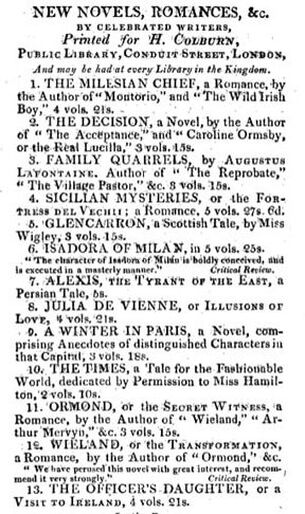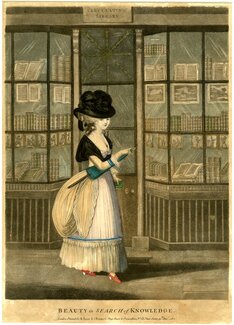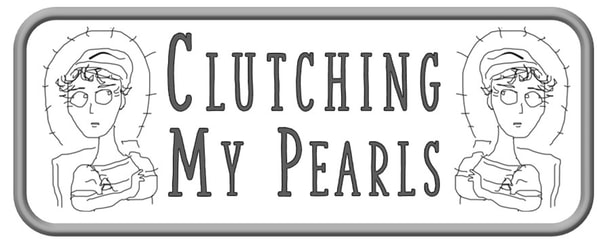
Twitter doesn’t allow for nuance, so I am going to assume this educator is in fact aware that we don’t read books just because they are old, despite the fact that she actually says, “It ain’t just about ‘being old.’”
I knew there were plenty of novels published in Jane Austen’s day, but I didn't know there were hundreds and hundreds of novels. Over the decades, the others have fallen away, and Austen’s works remain standing. The test of time takes time.
 Just a handful of the many novels published in 1812
Just a handful of the many novels published in 1812 Jane Austen's nephew wrote about his aunt's modest reputation in his lifetime: "Sometimes a friend or neighbour, who chanced to know of our connection with the author, would condescend to speak with moderate approbation of Sense and Sensibility, or Pride and Prejudice; but if they had known that we, in our secret thoughts, classed her with Madame D’Arblay or Miss Edgeworth, or even with some other novel writers of the day whose names are now scarcely remembered, they would have considered it an amusing instance of family conceit. To the multitude her works appeared tame and common-place, poor in colouring, and sadly deficient in incident and interest."
George Howard, Earl of Carlisle, an early fan of Austen's, wrote the following tribute in 1835. Addressing a female reader, Howard writes:
Beats thy quick pulse o'er Inchbald's thrilling leaf,
Brunton's high moral, Opies's deep wrought grief?
Has the mild chaperon claimed thy yielding heart,
Caroll's dark page, Trevelyan's gentle art?
Or is it thou, all perfect Austen? Here
Let one poor wreath adorn thy early bier
That scarce allowed thy youth to claim
Its living portion of thy certain fame
Every other author mentioned above would be known today to very few; only to people who specialize in reading 18th century literature. Everyone knows Jane Austen's name.
It ain't just about being old. It's about being excellent.

One consequence of this winnowing-out of hundreds of other 18th century authors, is that we don’t read Austen in the same context and we do not make the same comparisons her first readers did. Except for scholars and other aficionados of 18th century novels, we don’t read the books Austen read. (Those of us who do, most likely picked up the bug after reading Austen.) As I've discussed in previous posts, many talk about Austen's focus on money or social class as though this was something unique to her, when it wasn't.
I have been delving into these now-obscure authors and sharing my discoveries and thoughts on this blog. I've been learning about recurring novelistic tropes such as (death, coincidence, misunderstanding and rich uncles) and I've met some stock characters.
I first began reading these obscure books to research the question: "Was it controversial or dangerous to discuss slavery back in Jane Austen's time?" I suspected the answer was "no," but I wanted to check for myself. (The answer is indeed "no"). For those who read literature for social history, I have found many authors who were more explicit about social issues than Austen was. Within the pages of these novels I've found authorial voices speaking out against slavery, dueling, gambling, corrupt aristocrats, forced marriage, the military establishment, cock-fighting, religious fanaticism, and a host of social evils and excesses. Within these pages, I've learned more about how our values have evolved.
And I've read opinions which would jar on modern sensibilities. I've wondered if these authors were reflecting widely-held ideas or if they were censoring themselves in some respects. Speaking of the "values" that are in these "old books," did anyone seriously expect young women to behave like "perfect heroines" in real life?
I have learned about authors whose life stories--insofar as we know their life stories from the scanty records--are inspiring and touching.
But, in case you were wondering, I haven't yet found a forgotten author whose talent, in my opinion, approaches Austen.
Next post: The ladies discuss slavery.
| I love historical fiction and I love bringing history into my fiction. My Mansfield Trilogy touches on the amazing changes that were happening during Austen's time--the uprising of the Luddites at the dawn of the Industrial Revolution, the fight for autonomy for women, the coming revolution of steam power, the creation of societies to fight slavery and assist the working poor. Click here for more about my books. |
| Clutching My Pearls is about Jane Austen and the times she lived in. Click here for the first in the series. For more about obscure authors of Austen's era, click on the "Authoresses" category in the right-hand menu. |

 RSS Feed
RSS Feed